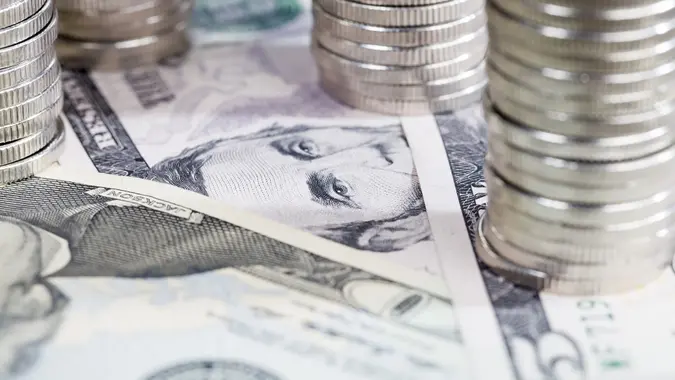3 Reasons To Move Money Into a CD in 2025

Commitment to Our Readers
GOBankingRates' editorial team is committed to bringing you unbiased reviews and information. We use data-driven methodologies to evaluate financial products and services - our reviews and ratings are not influenced by advertisers. You can read more about our editorial guidelines and our products and services review methodology.

20 Years
Helping You Live Richer

Reviewed
by Experts

Trusted by
Millions of Readers
Beyond just traditional savings accounts, there are a variety of ways to invest and save your money that can help it grow past the rate of inflation and build wealth over time.
Certificates of deposit (CDs) are one option that you might want to consider if you want a shorter-term investment and don’t need access to your funds right away.
Joseph Patrick Roop, president of Belmont Capital Advisors, explained three reasons why you may want to move a significant chunk of money into a CD in 2025, and a few caveats, too.
Safety and Predictability
The most likely reason you’d want to move money into a CD in 2025, Roop said, is to put them in “a safe place that has a predictable fixed rate of return for a specific period of time.”
CDs generally come with terms like three, six, 12 and 18 months, and a set interest rate yield that, once you lock in the CD, will not change for the duration of the CD period.
Saving For a Specific Goal
Another reason you may want to put money in a CD this year is to take funds outside of your normal money market or savings so you can allocate it for a specific purpose, Roop said.
“Sometimes having a separate certificate of deposit can be a good reason to allocate funds to a specific purpose such as emergency fund, future car or dream vacation.”
Consistency of Return
Perhaps the most attractive reason someone would move their money from a savings or money market account into a CD, Roop said, is that those accounts have variable interest that can go up or down by the day or week, whereas CDs do not.
“Therefore, if someone is concerned about rates dropping and going lower in 2025, that would be another reason to lock into a longer-term certificate of deposit now while rates are still higher.”
However, there are some caveats to consider before you lock in a CD, too.
Limit the Amount You Put Into a Single CD
The trick with CDs is to invest enough to make the return worthwhile, but not so much that you risk your funds. Roop explained that the FDIC only insures up to $250,000 in any account or financial product.
“If you plan to invest more than the FDIC will insure, talk to your banker or financial advisor about other ways to ensure that all of your funds are 100% insured and guaranteed.”
He said that many brokerage firms can allocate up to $25 million across different banks and different CDs so that you can keep the FDIC insurance protection and still manage your funds from one place.
Be Careful of Using CDs for Emergency Funds
If the only liquid funds you have to invest in a CD are your emergency funds, you may want to rethink that, Roop said. Emergency funds, by definition, are those saved for “something unplanned, something we were not counting on, and now we need to access financial resources quickly without penalty and without delays,” he said.
He doesn’t advise keeping those funds in a locked in CD because, although you can sometimes take that money out before the term is up, he pointed out, “The very nature of a CD is you are agreeing to put the money back, and if you access it before the end of the term, there could be penalties, delays or costs to access the funds.”
Instead, he recommended maintaining a high-yield savings or money market account that is easily accessible at a bank that is close to your home or where you travel.
“For a business traveler, this could mean utilizing a very large bank with branches across the United States. For someone who is retired and does not travel much, it could be a local bank that is very convenient to their home where the bankers know them very well.”
Pick Your CD Length Wisely
Additionally, when you are shopping for a CD, make sure that the length of time for your certificate of deposit matches your current financial plan and long-term financial goals, Roop said.
For example, if you are saving for a home in a year, then a 12-month CD would make sense, but if you’re saving for a vacation in six months, you’d want to go with a shorter term.
Have a Financial Plan
Most importantly, Roop warned not to put money into a CD just because it sounds like a good idea, but to do it as part of a larger financial plan. If there’s not a good reason for a CD, there are plenty of other kinds of investments.
“It is always confounding to me why long-term investors buy short-term investments and then say, ‘Well, I might need the money,’ but they cannot even articulate what they may need the money for. Having a written financial plan helps you live without fear and helps a person make more appropriate financial decisions that align with their plans, not their fears,” he said.
Rates Can Fluctuate
While The Federal Reserve Board has hinted at further rate cuts in 2025, Roop said, “We do not pretend to guess which direction rates will go. I can just tell you that historically, today, rates are higher than they have been on average over the last 20 years.”
However, if you are a risk-averse investor and you like the guarantees that CDs, government bonds or fixed annuities bring to the table, he said, “Now is probably a time to lock in longer-term durations that will be rewarding for many years to come.”
Consider an Alternative
For long-term investors, where taxes are a concern, he said it might make more sense to seek a multi-year guaranteed annuity, sometimes called an MYGA. “These plans offer tax-deferred growth on their fixed interest and many different time periods to lock in fixed rates.”
While CDs offer a safe and secure investment up to a certain dollar amount, always be sure to seek out advice from a financial advisor or accountant before you make a big investment.
 Written by
Written by  Edited by
Edited by 

























